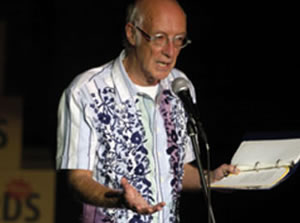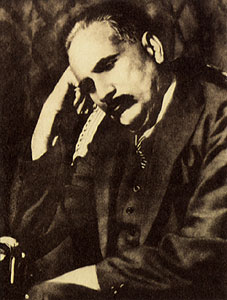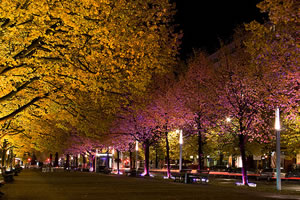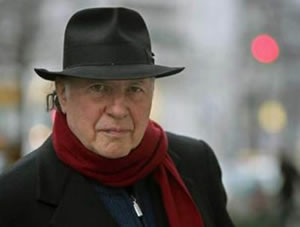De Engelse dichter en schrijver Roger Joseph McGough werd geboren op 9 november 1937 in Litherland, Lancashire. Zie ook mijn blog van 9 november 2008 en ook mijn blog van 9 november 2009 en ook mijn blog van 9 november 2010
The Leader
I wanna be the leader
I wanna be the leader
Can I be the leader?
Can I? I can?
Promise? Promise?
Yippee I’m the leader
I’m the leader
The Identification
So you think its Stephen?
Then I’d best make sure
Be on the safe side as it were.
Ah, theres been a mistake. The hair
you see, its black, now Stephens fair …
Whats that? The explosion?
Of course, burnt black. Silly of me.
I should have known. Then lets get on.
The face, is that the face mask?
that mask of charred wood
blistered scarred could
that have been a child’s face?
The sweater, where intact, looks
in fact all too familiar.
But one must be sure.
The scoutbelt. Yes thats his.
I recognise the studs he hammered in
not a week ago. At the age
when boys get clothes-conscious
now you know. Its almost
certainly Stephen. But one must
be sure. Remove all trace of doubt.
Pull out every splinter of hope.
Pockets. Empty the pockets.
Handkerchief? Could be any schoolboy’s.
Dirty enough. Cigarettes?
Oh this can’t be Stephen.
I dont allow him to smoke you see.
He wouldn’t disobey me. Not his father.
But that’s his penknife. Thats his alright.
And thats his key on the keyring
Gran gave him just the other night.
Then this must be him.
I think I know what happened
… … … about the cigarettes
No doubt he was minding them
for one of the older boys.
Yes thats it.
Thats him.
Thats our Stephen.

Roger McGough (Litherland, 9 november 1937)
De Indische dichter en schrijver Mohammed Iqbal werd geboren op 9 november 1877 in Sialkot in het tegenwoordige Pakistan. Zie ook mijn blog van 9 november 2006 en ook mijn blog van 9 november 2008 en ook mijn blog van 9 november 2010
Uit: Javid Nama (Book of Eternity, vertaald door Arthur J. Arberry)
Life out of the delight of absence and presence
fashioned forth this world of near and far;
so snapped asunder the thread of the moment
and mixed the hues of Time’s house of amazement.
On all sides, out of the joyous yearning for habitude
arose the cry: ‘I am one thing, you are another.’
The moon and the stars learned the way to walk,
a hundred lamps were kindled in the firmament.
In the azure heavens the sun pitched
its gold-cloth tent with its silver ropes,
raised its head over the rim of the first dawn
and drew to its breast the new-born world.
Man’s realm was a heap of earth, no more,
an empty wilderness, without a caravan;
not a river wrestled in any mountain,
not a cloud sprinkled on any desert,
no chanting of birds among the branches,
no leaping of deer amidst the meadow.
Sea and land lacked the spirit’s manifestations,
a curling vapour was the mantle of earth’s body;
the grasses, never having known the breeze of March,
still slumbered within the depths of earth.
The azure sky then chided the earth, saying:
‘I never saw anyone pass so miserable a life!
In all my breadth what creature is so blind as you?
What light is yours, save that drawn from my lamp?
Be earth high as Alvand, yet it is only earth,
it is not bright and eternal as the skies.

Mohammed Iqbal (9 november 1877 – 21 april 1938)
De Duitse dichteres en schrijfster Karin Kiwus werd geboren op 9 november 1942 in Berlijn. Zie ook mijn blog van 9 november 2008 en ook mijn blog van 9 november 2009 en ook mijn blog van 9 november 2010
Phantom
Wenn nichts mehr
Übrigbleibt außer
Einer Müdigkeit,
Die sich wortlos,
Allein
Zurückziehen will von allem
Dann wäre es vielleicht
Doch gut, manchmal
Wenigstens
Einen Namen
Zu wissen, den man
Murmeln könnte,
Ohne im Geringsten
Eine Erscheinung
Noch zu erwarten.
Schon genug
Unterwegs pickt der Spatz
Schnell noch mal
An der Bananenschale herum,
Setzt mit drei Sprüngen,
Von der Bahnsteigkante zur nächsten Pfütze
Trinkt ein paar Schluck,
Wartet den Schnabel erhoben
Bis die Kurswagen vorbei ziehn,
Schwingt sich dann
Leicht über die Gleise,
Landet in Fahrtrichtung
Und scheißt
Auf eine blanke Schiene

Karin Kiwus (Berlijn, 9 november 1942)
Berlijn, Unter den Linden
De joods-Hongaarse schrijver Imre Kertész werd geboren op 9 november 1929 in Boedapest. Zie ook mijn blog van 9 november 2006 en ook mijn blog van 9 november 2008 en ook mijn blog van 9 november 2010
Uit: Fateless
„I know of three means of escape from a concentration camp, because I either saw, heard, or experienced them. I lived by the first one, the most modest, perhaps: there is one aspect of human nature that, I had learned in school, is also a person’s inalienable right. It is true that our imagination remains free even in captivity. I could, for instance, achieve this freedom while my hands were busy with a shovel or a pickax — with a moderate exertion, limiting myself to the most essential movements only. I myself was simply not there. But still, imagination is only free within certain boundaries . . . .
Everybody knew full well what could result when a wake-up call in a concentration camp failed to wake up those who no longer wanted to be wakened. And there were those. This was the second route of escape. Who was not tempted — once, at least once — to do this? . . .
Finally there is the third, the most literal meaning of escape to consider. It seems there had been one example of that, only once, in our camp. There were three real escapees, all three Latvians, who were experienced and versed in the geography of the area and the German language, secure in what they were doing — so the rumor went. . . . The next evening on their return I tried not to look to the right. For there stood three chairs, and on them were three men, or rather three manlike creatures. . . . I also saw some kind of a construction . . . with three looped ropes hanging down from them, and I understood that this was a gallows…
Here three months sufficed for my body to desert me. I can say for certain that nothing is more awkward, nothing more discouraging, than noticing day after day, keeping track day after day, of how much we have rotted away. . . .
Let’s not exaggerate things, for this is precisely the hurdle: I am here, and I know full well that I have to accept the prize of being allowed to live. Yes, as I look around me in this gentle dusk in this square on a storm-beaten yet full-of-thousands-of-promises street, I already begin to feel how readiness is growing, collecting inside me. I have to continue my uncontinuable life. My mother is waiting for me.“

Imre Kertész (Boedapest, 9 november 1929)
Zie voor onderstaande schrijvers ook mijn blog van 9 november 2010.
De Amerikaanse schrijver, astronoom en populariseerder van de wetenschap Carl Edward Sagan werd geboren in New York op 9 november 1934. Zie ook mijn blog van 9 november 2008.
De Belgische humorist, cabaretier en schrijver Raymond Devos werd geboren in Moeskroen op 9 november 1922. Zie ook mijn blog van 9 november 2008.
